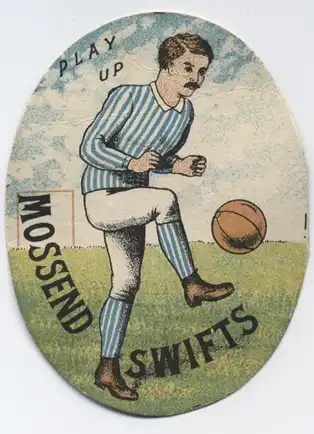| Full name | Crieff Football Club | |
|---|---|---|
| Founded | 1883 | |
| Dissolved | 1892 | |
| Ground | Market Park/Burnside Park | |
| Hon. President | Col. D. Moray [1] | |
| Secretary | R. A. Campbell | |
Crieff Football Club was a football club from the village of Crieff, Perthshire, Scotland.
| Full name | Crieff Football Club | |
|---|---|---|
| Founded | 1883 | |
| Dissolved | 1892 | |
| Ground | Market Park/Burnside Park | |
| Hon. President | Col. D. Moray [1] | |
| Secretary | R. A. Campbell | |
Crieff Football Club was a football club from the village of Crieff, Perthshire, Scotland.
The club was formed in 1883, originally under the name Crieff Juniors. [2] The club joined the Scottish Football Association in August 1884, [3] and from 1885 was simply called Crieff. [4]
Crieff first entered the Scottish Cup in 1884–85, losing 8–0 to Dunblane in the first round. [5] It entered the Cup every year until 1890–91, after which the Scottish FA introduced qualifying rounds. The club's run of results in the competition was extreme. It won two ties, both by big scores - 7–1 at Caledonian Rangers of Perth in 1887–88 [6] and 10–2 at home to Vale of Athole in 1888–89. [7] Its four defeats [8] were also by big scores; in every defeat the opposing team scored at least 7 goals, the nadir being a 12–0 defeat by a heavier Dunblane side in 1886–87. [9]
Crieff entered the Perthshire Cup from its first running, in 1884–85, until 1891–92. Its best performance was in 1889–90, when reaching the semi-final. The club lost at that stage 10–1 (plus one disputed) at home to Coupar Angus, [10] Lawson scoring seven goals for the visitors. [11]
The club played in the Perthshire Cup in 1891–92, its last game being a loss in the first round to Vale of Ruthven, [12] and was playing as late as January 1892. [13] Afterwards however the club seems to have been moribund, and was effectively replaced in the town by the new Crieff Athletic club. The Crieff Juniors name re-emerged in 1891–92, but it seems to be a new Junior club, which is also defunct within two seasons.
The club's colours were blue and white jerseys and hose, with (until 1885) white knickers, [14] or (afterwards) blue knickers. [15]
Crieff's first ground was Market Park, a 5-minute walk from the station. [16] By 1887 the club had moved to Burnside Park, [17] to which the media referred as Braehead Park. [18]
Dundee East End Football Club were a football club from Dundee, Scotland. The club were founded in 1877 but merged with Dundee Our Boys in 1893 to form Dundee.
Strathmore Football Club was a Scottish association football club based in the city of Dundee.
Bute Rangers Football Club was a Scottish association football club based in the town of Rothesay on the Isle of Bute.

Mossend Swifts were a Scottish senior football club from the shale mining village of Mossend, just to the north of the town of West Calder, West Lothian. There is now little left of this village.
Dunblane Football Club was an association football team from Dunblane, within the historic county of Perthshire, which entered the Scottish Cup for nearly three decades.
Coupar Angus Football Club, known as Vale of Strathmore Football Club in 1877–78, was an association football club from Coupar Angus in Scotland. The club was a regular entrant to the Scottish Cup, entering every season from 1878–79 to 1892–93, and once won the Perthshire Cup.
Fair City Athletic Football Club was a football club from Perth in Scotland. It was one of the top two clubs in Perth in the 1890s but a disastrous ground move led to the club's dissolution in 1902.
The Oban Football Club was a football team based in Oban, Scotland.
Stenhousemuir Football Club was a Scottish football club located in Stenhousemuir, Falkirk.
West End Football Club was an association football club from Dundee, Scotland.
Pollokshields Football Club was a Scottish football team, based in the Pollokshields district of Glasgow. From 1885 the club was called St Andrew's.
Airdriehill Football Club was a Scottish association football club based in the town of Airdrie, Lanarkshire.
Kelvinside Athletic Football Club was a 19th-century athletics club from Kelvinside in Glasgow, originally the footballing branch of the Glasgow United YMCA Athletic Club.
Dalry Football Club was an association football club from Dalry, Ayrshire, Scotland.
Angus Football Club was an association football club from Forfar in Scotland. Although it was entirely unsuccessful as a club, it was instrumental in the formation of Forfar Athletic.
Tollcross Football Club was a 19th-century football club from Tollcross, in the east end of Glasgow.
Pollokshaws Harp Football Club was a Scottish football team, based in Pollokshaws, now part of Glasgow.
Our Boys (Blairgowrie), also known as Blairgowrie Our Boys, was a football club from Blairgowrie in Perthshire, Scotland.
Johnstone Wanderers Football Club, originally called Wanderers before 1891, was an association football club from Dundee, Scotland.
Rangers Football Club was a Scottish football team located in the town of Greenock, Renfrewshire.